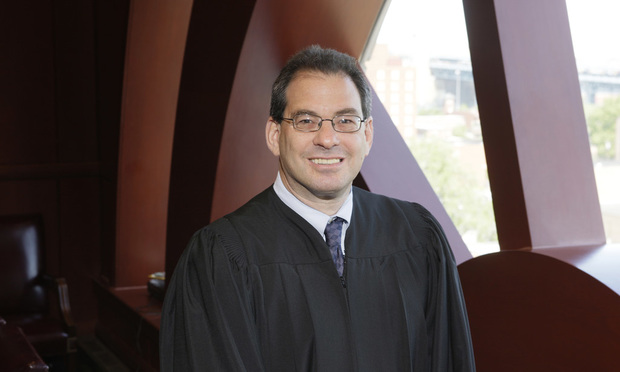Benicar Plaintiffs Lawyers' Complaints About Pay Rates Rejected
U.S. Magistrate Judge Joel Schneider ruled that the lawyers' committee that divided up legal fees in the multidistrict litigation treated Gerald Williams and Mark Cuker "fairly and equitably."
November 06, 2019 at 05:32 PM
5 minute read
 U.S. Magistrate Judge Joel Schneider of the District of New Jersey.
U.S. Magistrate Judge Joel Schneider of the District of New Jersey.
A federal judge in Camden has overruled objections by two plaintiffs-side lawyers in the Benicar multidistrict litigation that their share of legal fees in the case was inadequate.
Gerald Williams and Mark Cuker took issue with the $110,000 they were awarded for 1,066 hours worked in the case, which was settled in 2017 for $300 million. Their effective hourly rate was $103, which they said was far lower than the amounts paid to other firms under similar circumstances.
But U.S. Magistrate Judge Joel Schneider of the District of New Jersey on Tuesday said the lawyers' committee that divided up legal fees treated Williams and Cuker "fairly and equitably" when it factored in the type of work they performed and the relative importance of their work.
The litigation concerned allegations that Benicar, a blood pressure medicine sold by defendant Daiichi Sankyo, caused severe gastrointestinal problems. Roughly 2,000 cases filed in federal courts nationwide were consolidated in U.S. district court in Camden before U.S. District Judge Robert Kugler and Schneider in 2015.
Fees for the plaintiffs lawyers are to be paid out of a common benefit fund that consists of 8% of the settlement. In February, Kugler appointed plaintiffs lawyers in the case to a common benefit committee that was assigned to allocate fees in a fair, objective and transparent manner.
According to the court, in its preliminary recommendation, issued in June, the common benefit committee awarded $100,000 to Williams and Cuker for 1,125 hours of work, resulting in an effective hourly rate of $89. After hearing objections from Williams and Cuker, their hours of work eligible for payment from the common benefit fund was reduced to 1,066, and its award was increased to $110,000.
Williams and Cuker asked the court to increase its billing rate to $272 per hour, which would bring its award to $290,000.
Williams and Cuker did not respond to requests for comment about the ruling.
Williams is with Williams Cedar in Philadelphia. Cuker is a solo practitioner in Philadelphia. They previously practiced together with a third partner, Esther Berezofsky, at Williams Cuker Berezofsky, which split apart in 2017. (Berezofsky operated her own firm for about 18 months after the split but is now with Motley Rice in Cherry Hill).
Analyzing the committee's award to Williams and Cuker in Tuesday's decision, Schneider said that when it comes to allocation of common benefit funds, not all types of work are created equal. The committee evaluated "the totality of the circumstances" when it decided how much to allocate, with the importance of the work and the quality of the work being the most important factors, Schneider said.
He cited conclusions of the committee that work done by lawyers other than Williams and Cuker was of a "higher level of complexity and importance," and that many billed items that Williams and Cuker sought were not for the common benefit of plaintiffs. In addition, the common benefit committee took note that many of Williams' and Cuker's hours were spent reviewing documents in preparation for a "minor witness" in the case, Schneider said.
Schneider also refuted the assertion that Williams and Cuker were treated differently than other firms. He cited Pearson Randall & Schumacher, a Minneapolis firm, and Taylor Martino Rowan of Mobile, Alabama. Pearson Randall was awarded an hourly rate of $51.81, half of the rate paid to Williams and Cuker, and did not object to its allocation, Schneider said. Taylor Martino was paid an hourly rate of $132, which is 20% more than Williams and Cuker, but that firm devoted significant time to a workup of bellwether cases selected by the court, Schneider said.
Also, Williams and Cuker contended that they were shortchanged by the committee based on the fact that they paid only $80,000 of the $105,000 common benefit assessment they were asked to contribute, but Schneider rejected that argument. Schneider did say that, although the issue was not discussed at length in the committee's final report, he agrees that failure to pay a common benefit assessment in full should be an important factor in the allocation of fees from a common benefit fund.
"In order to assure the smooth management of an MDL, every reasonable step should be taken to incentivize firms to timely and fully pay their assessments. If this means treating firms harshly in the short term as a trade-off for a long-term benefit, so be it," Schneider said.
As for Williams' and Cuker's request for $272 an hour, Schneider noted as a comparative example that Robins Kaplan was awarded $248 per hour, but that firm's Tara Sutton was on the plaintiff's executive committee, was chair of the science and expert committee, and participated in numerous court conferences, arguments and settlement discussions. In addition, another attorney from that firm, Rayna Kessler, served as liaison counsel to the New Jersey state court litigation.
Another firm, Lieff Cabraser Heimann & Bernstein, was awarded $259 an hour. Its attorneys included a co-chair of the science committee, and they were instrumental to preparing expert reports and attending and defending expert deposition firms, Schneider said.
It would be "inequitable" to award Williams and Cuker $272 when those firms were paid less, Schneider said.
The common benefits committee's work was "necessarily subjective," but its allocation to Williams and Cuker was fair, reasonable and equitable, and rightly based on the committee's collective consideration of those lawyers' contribution to the common benefit, Schneider said.
This content has been archived. It is available through our partners, LexisNexis® and Bloomberg Law.
To view this content, please continue to their sites.
Not a Lexis Subscriber?
Subscribe Now
Not a Bloomberg Law Subscriber?
Subscribe Now
NOT FOR REPRINT
© 2025 ALM Global, LLC, All Rights Reserved. Request academic re-use from www.copyright.com. All other uses, submit a request to [email protected]. For more information visit Asset & Logo Licensing.
You Might Like
View All
NJ Firm Narrowly Avoids Case Dismissal Over Lengthy Complaint Filed in Fed Court
4 minute read
AstraZeneca Files Flurry of Lawsuits to Protect Cancer Treatment Drug
3 minute read

Trending Stories
- 1South Florida Attorney Charged With Aggravated Battery After Incident in Prime Rib Line
- 2'A Death Sentence for TikTok'?: Litigators and Experts Weigh Impact of Potential Ban on Creators and Data Privacy
- 3Bribery Case Against Former Lt. Gov. Brian Benjamin Is Dropped
- 4‘Extremely Disturbing’: AI Firms Face Class Action by ‘Taskers’ Exposed to Traumatic Content
- 5State Appeals Court Revives BraunHagey Lawsuit Alleging $4.2M Unlawful Wire to China
Who Got The Work
J. Brugh Lower of Gibbons has entered an appearance for industrial equipment supplier Devco Corporation in a pending trademark infringement lawsuit. The suit, accusing the defendant of selling knock-off Graco products, was filed Dec. 18 in New Jersey District Court by Rivkin Radler on behalf of Graco Inc. and Graco Minnesota. The case, assigned to U.S. District Judge Zahid N. Quraishi, is 3:24-cv-11294, Graco Inc. et al v. Devco Corporation.
Who Got The Work
Rebecca Maller-Stein and Kent A. Yalowitz of Arnold & Porter Kaye Scholer have entered their appearances for Hanaco Venture Capital and its executives, Lior Prosor and David Frankel, in a pending securities lawsuit. The action, filed on Dec. 24 in New York Southern District Court by Zell, Aron & Co. on behalf of Goldeneye Advisors, accuses the defendants of negligently and fraudulently managing the plaintiff's $1 million investment. The case, assigned to U.S. District Judge Vernon S. Broderick, is 1:24-cv-09918, Goldeneye Advisors, LLC v. Hanaco Venture Capital, Ltd. et al.
Who Got The Work
Attorneys from A&O Shearman has stepped in as defense counsel for Toronto-Dominion Bank and other defendants in a pending securities class action. The suit, filed Dec. 11 in New York Southern District Court by Bleichmar Fonti & Auld, accuses the defendants of concealing the bank's 'pervasive' deficiencies in regards to its compliance with the Bank Secrecy Act and the quality of its anti-money laundering controls. The case, assigned to U.S. District Judge Arun Subramanian, is 1:24-cv-09445, Gonzalez v. The Toronto-Dominion Bank et al.
Who Got The Work
Crown Castle International, a Pennsylvania company providing shared communications infrastructure, has turned to Luke D. Wolf of Gordon Rees Scully Mansukhani to fend off a pending breach-of-contract lawsuit. The court action, filed Nov. 25 in Michigan Eastern District Court by Hooper Hathaway PC on behalf of The Town Residences LLC, accuses Crown Castle of failing to transfer approximately $30,000 in utility payments from T-Mobile in breach of a roof-top lease and assignment agreement. The case, assigned to U.S. District Judge Susan K. Declercq, is 2:24-cv-13131, The Town Residences LLC v. T-Mobile US, Inc. et al.
Who Got The Work
Wilfred P. Coronato and Daniel M. Schwartz of McCarter & English have stepped in as defense counsel to Electrolux Home Products Inc. in a pending product liability lawsuit. The court action, filed Nov. 26 in New York Eastern District Court by Poulos Lopiccolo PC and Nagel Rice LLP on behalf of David Stern, alleges that the defendant's refrigerators’ drawers and shelving repeatedly break and fall apart within months after purchase. The case, assigned to U.S. District Judge Joan M. Azrack, is 2:24-cv-08204, Stern v. Electrolux Home Products, Inc.
Featured Firms
Law Offices of Gary Martin Hays & Associates, P.C.
(470) 294-1674
Law Offices of Mark E. Salomone
(857) 444-6468
Smith & Hassler
(713) 739-1250






